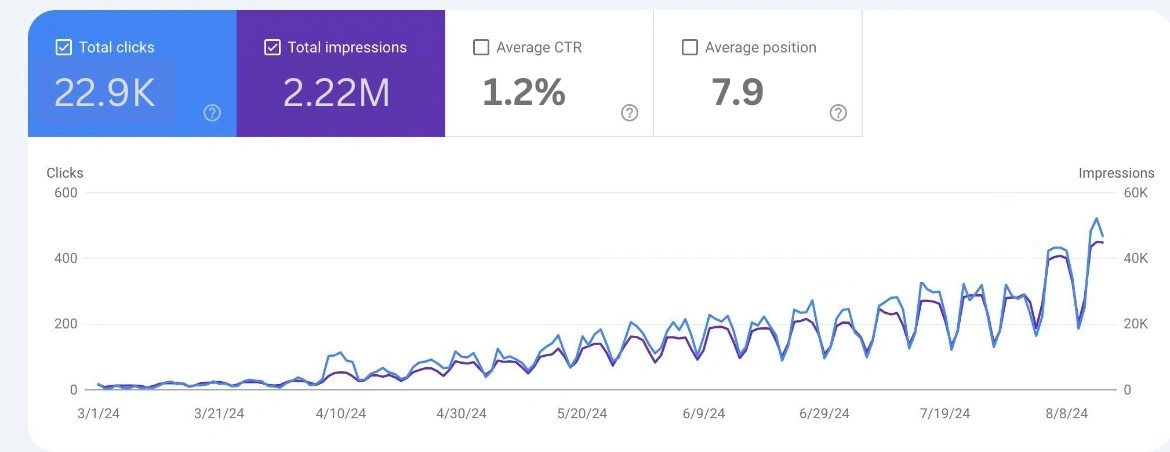
SEO for Small Business
Tailored Strategies for Every Growth Stage
What if your dream customers could find your business the moment they needed your product or service?
Right now, countless small businesses are hidden in plain sight, buried beneath competitors in search engine results. Could this be you?
The truth is, search engine optimization (SEO) isn’t just about keywords or rankings; it’s about creating a roadmap that connects your business to the people who matter most. I understand that jumping into SEO can feel like navigating a maze of conflicting advice, but you don’t have to go it alone. I’m here to guide you with simple, tailored strategies designed to grow with your business at every stage.
Let’s get started — your customers are waiting!

Explore the Digital World of SEO for Small Businesses
The digital world has transformed a lot over the years, especially after the pandemic! Nowadays, more folks are turning to the internet to find everything from a cozy café nearby to specific services they need.
To keep up with this change including the latest artificial intelligence advancements, mastering search engine marketing has become super important. With the right SEO strategy, you can turn those online searches into loyal customers! It’s not just about Google Ads or flashy social media campaigns; it’s all about engaging content that connects with people who are looking for what you offer.
A solid SEO strategy can turn online searches into loyal customers who genuinely enjoy what you have to share! Learn more about the power of content marketing in this journey.
The Ever-Evolving Landscape of SEO
Search engine optimization (SEO) is a dynamic field that necessitates ongoing adaptation and learning. These algorithms are updated regularly, and what worked well yesterday might not be as effective today. To stay ahead of the curve, it's important to base your SEO strategy on the latest research and best practices, to strengthen your well-researched content.
Staying Informed with Google Search Central a valuable resource for staying up-to-date on SEO best practices. This website, maintained by Google itself, provides official guidance on how to optimize your website for search. It includes detailed documentation, helpful videos, and webmaster tools to help you track your SEO progress. Visit their website if you want to dig even deeper
Key SEO Considerations for the Future
Based on recent SEO research and trends, here are some key considerations to keep in mind as you future-proof your SEO strategy:
Mobile-First Indexing
Google has shifted to a mobile-first indexing approach, meaning the mobile version of your website is now the primary version used for ranking purposes. This emphasizes the importance of having a mobile-friendly website that offers a seamless user experience on all devices.
Core Web Vitals
Google utilises a collection of measures called Core Web Vitals to assess your website's responsiveness, loading speed, and visual stability. These metrics are becoming increasingly important for ranking, so optimizing your website for Core Web Vitals is essential.
Entity SEO
Entity SEO focuses on building your website's topical authority and establishing your brand as a trusted source of information on specific topics. This involves creating high-quality content, optimizing for relevant keywords, and earning backlinks from high-authority websites.
User Experience (UX) Signals
Search engines are placing more emphasis on user experience (UX) signals when ranking websites. This includes factors like bounce rate, time on page, and click-through rate (CTR). By creating content that is engaging, informative, and meets the needs of your target audience, you can improve your website's UX and boost your SEO performance.
Voice Search Optimization
Voice search is becoming increasingly popular, so optimizing your content for voice queries is important. This means using natural language, answering common questions, and targeting long-tail keywords that people might use in voice searches.
Artificial Intelligence (AI) and Machine Learning
Artificial intelligence (AI) and machine learning are playing an increasingly important role in SEO. Search engines are using these technologies to better understand the meaning and intent behind search queries. By creating content that is relevant, informative, and addresses the user's intent, you can improve your website's ranking potential.
Just Keep Learning
By staying informed about the latest SEO trends and best practices, you can develop a future-proof SEO strategy that will help your website achieve long-term success in search results. By focusing on mobile-friendliness, Core Web Vitals, entity SEO, UX signals, voice search optimization, and AI considerations, you can ensure that your website remains visible and relevant in the ever-evolving world of SEO.

Stage 1: Just Starting Out
A. Laying the SEO Foundation
Starting out? Here’s where the magic begins. Doing keyword research is a bit like discovering the magic phrases your future customers are using! Make sure to set up your Google Ads account and create a Google My Business profile to help you shine online. And as you work on your website, don't forget about SEO! Even a simple site can attract a lot of organic traffic if you give it the right attention. Happy building! Check out our copywriting services to ensure your message resonates.
Actionable steps:
- Keyword detective work: Why not take a moment to check out Google's Keyword Planner or Ubersuggest? It's like having a magic tool that reveals what your customers are really looking for! Just search for those appealing, high-volume keywords that align perfectly with your business or service./li>
- Google's golden tickets: Get started with Google Analytics and Google Search Console! They’re totally free and full of valuable insights. It’s like having a VIP pass to see how your website is doing behind the scenes!
- Content creation station: Why not kick off a blog on your website? Try writing a fun post each week about topics that matter to your customers. It's a great way to answer their burning questions! Remember, it’s not just about selling – it’s about solving problems and satisfying curiosity.
- Meta tag magic: Craft unique, keyword-rich meta titles and descriptions for each page. Think of them as your website's elevator pitch to searchers and Google.
B. Local SEO Essentials
Want to become the go-to hero in your community's search results? It’s all about local SEO! When folks in your area are looking for services like yours, you want to be the one they find. Plus, using Google Shopping Ads can give your products a nice little boost, helping you shine in those local searches. Let’s get you noticed! Storytelling in Branding is sharing stories that can really help you connect with your local community. It’s a great way to make your brand feel more relatable and engaging for everyone around you!
- NAP time (Name, Address, Phone): Keep your business information consistent across all online platforms! Think of it as leaving a friendly trail of breadcrumbs for both your customers and search engines to follow. It makes it easier for everyone to find you!
- Review revolution: If you have happy customers, why not encourage them to share their experience with a Google review? You could set up a simple system, like a friendly follow-up email or a quick text after their purchase. It’s a great way to spread the word about your business in today’s digital world!
- Local link love: Team up with other nearby businesses or get involved in local events! Every local backlink acts like a little vote of confidence in our neighborhood's online community. It’s a great way to support each other!
- Get listed: Why not take a moment to submit your business to local directories and some relevant industry listings? It’s a great way to get noticed! Plus, keeping an eye out for potential synergies might lead to some awesome win-win situations.
C. Content Creation for New Businesses
It's the perfect moment to share your story! Think of your content as a friendly chat with your future customers. What are they looking for? Start crafting those important web pages that match their needs. An effective content strategy can help you attract more visitors and plenty of happy faces! Need a hand? Our content marketing services can guide you.
Actionable steps:
- Solve real problems: Make sure to create content that addresses the questions your customers are really curious about! A great way to discover what people are asking in your industry is by using tools like Answer the Public. It can help you connect with your audience and provide the answers they’re seeking.
- Mix it up: Why not mix things up a bit? Instead of just sticking to blog posts, why not try infographics, videos, or even podcasts? It's like offering a delicious content buffet — there's something for everyone to enjoy!
- Optimize everything: When creating your content, try to include your target keywords in a way that feels natural — this includes using them in your headings and image alt text. Just keep in mind that it’s most important to write for your readers first and then for search engines.
- Freshness factor: Keep your content fresh and updated! Search engines really appreciate it, and your customers do too. It’s all about staying in tune with the latest trends and giving your audience something exciting to explore.

Stage 2: Expanding Your Reach
A. Advanced Keyword Strategies
Now that you're on the map, let's look a little deeper! It’s time to explore long-tail keywords that can help you connect with more specific searches. Think about spreading your target keywords across your site in a thoughtful way. This is your chance to become the go-to choice for folks who are looking for exactly what you offer. Let’s also peek into some advanced techniques in email marketing strategies.
Actionable steps:
- Long-tail treasure hunt: Ever wondered, "What are the best SEO tips for small businesses?" Wow, that's a fantastic treasure trove of long-tail keywords! Try using tools like Answer the Public to discover even more of these hidden gems.
- Competitor keyword sleuthing: Want to know which keywords your competitors are ranking for? It can be really insightful! Tools like SEMrush and Ahrefs are great for giving you a sneak peek into their strategies. Give them a try!
- Semantic search savvy: Want to help Google grasp the context of your content? A fun way to do this is by using a related keyword finder, like LSI Graph. It can help you discover related terms that you can seamlessly mix into your writing. This way, your content will be more engaging and easier for Google to understand!
- Voice search optimization: With more people asking, "Hey Siri, find SEO companies for small business near me," If you want to make the most of voice search, think about using more natural language and focusing on questions people might ask. It's all about being conversational!
B. Paid Search Campaigns
Are you excited to take things to the next level? It’s time to combine your SEO efforts with some PPC advertising! Running paid search campaigns can bring in more qualified visitors to your site. Plus, by pairing it with your organic searches, you can discover which keywords really work best for you. Let’s boost your traffic together!
Actionable steps:
- Google Ads 101: Are you curious if SEO is really worth it for your small business? While organic SEO is super important, don’t forget about the benefits of paid search too! Why not start with a budget of just $100 for Google Ads and try out a few different ad copies? It's a great way to test the waters!
- Retargeting magic: Have you ever seen ads popping up after you've visited a website? That's what we call retargeting! It's a handy way to stay connected with your audience. By using Google's retargeting pixel, you can show ads to those who have visited your site, making it easier to remind them about what you offer!
- Landing page perfection: When creating an ad campaign, it’s a great idea to have a unique landing page for each one. Think about this: "Does this page really answer the question my ad aimed to solve?" Keep things simple and inviting, making it easy for visitors to turn their interest into a lead!
- Local ad targeting: Looking for "SEO companies for small businesses near me"? Why not become that go-to company! Use location targeting in your ads to connect with local customers and make a real impact!
Staying in touch really helps you stay fresh in your new leads' minds! Discover how to make your campaigns even better by picking up tips from Mastering Email Subject Lines to boost your ROI.
C. Content Marketing and Link Building
As you grow, it’s important to establish your authority! Create amazing content that people will want to link to and share with their friends. This can really boost your traffic with the right audience. Plus, our social media management services are here to help spread the word and get your content seen by more people!
Actionable steps:
- Guest posting: Have you ever thought, "How can I share my content with more people?" Guest posting might be just what you're looking for! Connect with industry blogs and offer them some valuable content. It's a great way to showcase your expertise and reach a bigger audience!
- Infographic impact: Did you know that visuals get shared 40 times more than text? Why not whip up a fun infographic about your solution? It could really catch on and spread like wildfire!
- Broken link building: Want to be a hero for fellow website owners? Try using tools like Ahrefs to spot broken links in your niche. Then, you can reach out and offer your content as a helpful replacement!
- Social media syndication: Want to spread the word about your content? Share it on your favorite social media platforms! It’s like cranking up the volume on your SEO efforts, making sure more people get to hear your message!
Technical SEO Improvements
Make sure your site runs like a breeze — nobody enjoys waiting around! Optimizing for speed and focusing on mobile-first indexing helps keep your visitors happy and engaged, whether they’re browsing on their phone or desktop.
Actionable steps:
- Speed optimization: Have you ever wondered, "Why is my website so slow?" No worries! Check out Google's PageSpeed Insights to help you spot and fix any speed issues. Remember, aiming for a loading time of around 2 seconds can really help keep your visitors engaged!
- Mobile-first indexing: With Google's mobile-first approach, it’s more important than ever to ensure your site is mobile-friendly! Why not check it out with Bing's Mobile-Friendly Test? It's a quick and easy way to see how you’re doing!
- Schema markup magic: Looking to make your content shine in search results? Consider using schema markup! It’s a helpful code that tells search engines more about what you offer, making your listings pop and stand out.
- SSL security: Did you know that HTTPS is now a ranking factor? If you're still using HTTP, it might be a great idea to make the switch! Not only is it important for your SEO, but it also really helps build trust with your users.

Stage 3: Maintaining Market Share
A. Brand Promotion and SEO
You’ve built a name — now let’s make sure it shines online. Boost your brand online with SEO. It supports your digital marketing strategy.
Ever worried about your online privacy? Check out our blog social media privacy for some friendly tips! ! These strategies will help you stay ahead and keep your information safe. Happy reading!
Actionable steps:
- Brand SERP optimization: Ever Googled your business name? You control what appears with Brand SERP optimization. It’s a great idea to take charge of your brand's search results! You can do this by optimizing your content and creating meaningful, shareable content that really showcases what you’re all about.
- Thought leadership content: Are you looking to shine in a busy market? Try creating content that really dives deep and shows off your expertise! Share your knowledge in a way that feels approachable and easy to understand. The more genuine and relatable you are, the more you’ll stand out!
- PR and SEO synergy: Want to boost your SEO with your PR efforts? It's all about getting those mentions and links from respected news sites and industry publications! Whenever you have something exciting to share, don’t forget to do a press release. It’s a great way to get the word out!
- Employee advocacy: Have you thought about your best brand ambassadors — your amazing employees? Encourage them to share and engage with your content on social media. It can really make a difference!
B. Advanced Analytics and Reporting
To really get ahead, it’s all about the numbers! Dive into those monthly reports and explore some great tools to discover what’s effective. Think of SEO like gardening — when you nurture it with the right tools, you’ll cultivate a vibrant online presence. Just remember, it takes time and a bit of ongoing care to see all the wonderful results!
Actionable steps:
- Custom dashboard creation: Feeling overwhelmed by data? Why not create a custom Google Analytics dashboard that highlights the SEO metrics that matter most to you! It’s a great way to get the insights you need without the clutter.
- Conversion tracking mastery: Are you keeping an eye on the right conversions? Setting up goals in Google Analytics can help you measure what truly matters for your business. Let’s make sure you’re tracking what’s important!
- A/B testing for SEO: Want to find out what content really shines? Give Google A/B Testing in Google Analytics a try! It's a fun way to see what your audience loves! This will take you to Google's help center for detailed instructions on A/B testing. In the meantime, we're working on a more in-depth guide. You can try the Analytics Exploration Flow to run A/B tests on your titles, meta descriptions, and content.
- Regular SEO audits: When was the last time you gave your website an SEO check-up? It's super helpful to use tools like Screaming Frog to do regular technical SEO audits. Keeping an eye on it can really make a difference!
C. Competitive Analysis and Adaptation
It’s great to keep an eye on what your competitors are up to, but remember to embrace what makes you special. Staying informed about competitive trends and updates to search algorithms can help you adapt your strategy without letting any opportunities slip by. You’ve got this!
Actionable steps:
- SERP tracking: Curious about who’s ranking for your target keywords? It’s super helpful to use tools like SEMrush to keep an eye on your SERP positions and see how you stack up against your competitors. Happy tracking!
- Backlink gap analysis: Are you curious about where your competitors are snagging their links? Try using tools like Ahrefs! They can help you discover link opportunities that you might be overlooking. Happy linking!
- Content gap analysis: Have you checked out what topics your competitors are covering that you might be missing? Using content gap analysis tools can be a fun way to discover fresh ideas for your own content!
- Algorithm update adaptation: Staying ahead of Google’s algorithm changes can be a breeze! Just keep an eye on SEO news sources like Search Engine Journal, and you’ll be all set to tweak your strategy whenever something new comes up.
D. Diversifying Search Presence
Why limit yourself to just one search engine? Exploring different ones can uncover exciting new possibilities! Plus, diving into specialized vertical searches could help you connect with your next loyal customer. Give it a try!
Vertical search engines include the following examples:
- TripAdvisor for reviews of hotels and other travel-related businesses
- Indeed for job search
- Kayak for flight search
- Google Images for graphic search
- Google News for news
Actionable steps:
- Image SEO optimization: Did you know that Google Images can be a great way to bring more visitors to your site? Just make sure to optimize your image file names, alt text, and captions for image search. It really helps drive traffic right back to you!
- Video SEO: Looking to make the most of the world's second-largest search engine, YouTube? It's easier than you think! Start by creating and optimizing fun video content to boost your visibility. Don’t forget to share your site links in the comments to keep the conversation going. Enjoy the journey!
- Podcast SEO: Have you thought about starting a podcast? It’s such a fun way to connect with new audiences and you can even build backlinks through your show notes. It could be an exciting adventure!
- Social Media: Have you tried using hashtags in your searches? It’s a great idea to include relevant hashtagged keywords in your social posts! It can really help increase your visibility. Give it a go!
Cross-Stage SEO Strategies
A. Voice Search Optimization
Imagine this: someone asks their voice assistant about your services, and just like that — your business pops up as the top choice! That’s the magic of voice search optimization. It’s super important for local SEO, so it’s a great idea to get your content ready for those voice-activated searches. It’s an exciting way to connect with more customers!
Actionable steps:
- Featured snippet optimization: Want to make your content shine in search results? A great tip is to aim for those featured snippets! They’re frequently used in voice search results, so optimizing for them can really help your visibility. Keep it friendly, conversational and straightforward, and you'll be on the right track!
- Question-based content: Since voice searches usually come in the form of questions, it’s a great idea to adjust your content. Try creating pieces that directly answer the common questions people have in your industry. It’s a friendly way to connect and provide value!
- Local voice search: Did you know that many "near me" searches are done using voice commands? It's a great idea to make sure your Google My Business listing is fully optimized for those local voice searches. That way, you can connect with more people in your area!
- Conversational keywords: To make your content more friendly for voice searches, try using natural and conversational language. It’s all about sounding like you’re having a chat with someone rather than writing something super formal!
B. E-commerce SEO
Hey there, online store owner! Don't forget to give some TLC to your product pages! A well-crafted description and glowing reviews can really help attract more shoppers to your shop. Plus, having plenty of customer reviews not only builds trust but also gives your SEO a nice little boost.
Actionable steps:
- Product page optimization: Want to make your product pages stand out to search engines? Think about using unique descriptions that capture your products' essence, showcasing high-quality images that draw attention, and including customer reviews that build trust. These simple tips can really make a difference!
- Category page SEO: Are your category pages reaching their full potential? Let’s give them a little love! Adding unique content and smart internal linking can really give your e-commerce SEO a boost.
- Site structure for e-commerce: Is your site structure making SEO easier or harder for you? Creating a clear and logical layout can really help search engines crawl your site more easily. It’s a great way to boost your SEO!
- Schema markup for products: Looking to make your products shine in search results? Try using product schema markup! It helps you showcase rich snippets with prices, availability, and reviews, making it easier for customers to find what they need.
Video SEO
Did you know that adding video content can really help boost your SEO? People enjoy watching videos before making a purchase, so it’s a great idea to dive into some YouTube optimization strategies. It's a fun way to share your story and connect with even more viewers!
Actionable steps:
- YouTube keyword research: Did you know that YouTube has a handy keyword tool? You can use its search suggest feature to discover popular video topics! It’s a great way to find what people are excited about.
- Video title and description optimization: Want to make your videos easier to find? Try using your target keywords in the titles and descriptions! It’s a simple way to help more people discover your content.
- Custom thumbnails: Looking to get more clicks on your videos? Try making some fun, eye-catching custom thumbnails! They can really help your videos stand out in search results.
- Video transcripts: How can you make your video content work harder for SEO? Add transcripts to your videos to give search engines more text to crawl.
Measuring SEO Success at Each Stage
Wondering if your SEO efforts are making a difference? Keep an eye on some key performance indicators (KPIs) like your website traffic, conversion rates, and your rankings in search results. This will help you celebrate your successes and fine-tune any areas that need a little extra love! If you're interested in getting personalized insights, feel free to reach out for a content audit. We’re here to help!
Actionable steps:
- Traffic analysis: Are you seeing an increase in your organic traffic? It’s a great idea to use Google Analytics to keep an eye on how your traffic is growing over time.
- Keyword ranking tracking: How are your target keywords performing? Use tools like SEMrush or Ahrefs to track your keyword rankings.
- Conversion rate optimization: Is your SEO traffic turning into real results? Let's set up goal tracking in Google Analytics so you can easily see how your SEO efforts are leading to conversions!
- ROI calculation: Curious about how your SEO investment is paying off? You can find out your SEO ROI by comparing the value of your organic traffic to what you’re spending on SEO. It's a great way to see the impact of your efforts!
Future-Proofing Your SEO Strategy
SEO isn’t just a one-time effort — it’s a journey that adapts to the constantly changing digital world. Trends may come and go, but having a smart strategy in place will help you stay ahead of the game! By keeping an eye on shifts in search engine marketing and what your customers are up to, you'll be well-equipped to thrive no matter what comes next. If you want to stay on your A-game, feel free to reach out to us!
Actionable steps:
- AI and machine learning in SEO: How will AI change the game for SEO? Make sure to keep up with the latest in AI and machine learning, as they could have a big impact on how search works!
- Mobile-first indexing: Is your website all set for mobile-first indexing? Make sure your mobile site has the same content and layout as your desktop version to keep everything consistent. You're doing great!
- Core Web Vitals optimization: Are you ready for Google's Page Experience update? It’s a great time to focus on improving your Core Web Vitals to enhance user experience and boost your SEO. Let’s make your website even better!
- E-A-T focus: Want to show your expertise, authority, and trustworthiness? It’s all about creating high-quality content that really shines! Shareable content is key to building a great online reputation. Just focus on providing value, and you’ll be on the right track!
FAQ: Your Burning SEO Questions Answered
- Identify the keywords your target audience uses to find products or services like yours.
- Optimize your website's content by strategically incorporating these keywords into page titles, meta descriptions, and headings.
- Claim and optimize your Google My Business profile to increase visibility in local search results.
- Create high-quality content that addresses your audience's questions and needs.
- Build high-quality backlinks from authoritative websites to improve credibility and search rankings.
- On-page SEO: Optimizing the content and HTML code on your site to match search intent.
- Off-page SEO: Building backlinks and establishing authority through external references.
- Technical SEO: Improving website speed, ensuring mobile-friendliness, and making it easier for search engines to crawl your site.
- Identifying target keywords that match the products or services you offer.
- Creating valuable content that attracts and retains your ideal customers.
- Building backlinks to increase your website’s authority and credibility.
- Tracking your progress through analytics and adjusting your strategy based on what’s working.
SEO is an ongoing process. Keep learning and adapting to stay ahead of the curve.
Conclusion
So there you have it, friend — no matter where your business is on its journey, there’s SEO strategy content just for you. Keep refining, keep adapting, and watch as those search results turn into real connections with new customers. Ready to make your mark online? Let’s get to it! This guide is designed to make SEO feel less like a mystery and more like a roadmap to success. It’s about working smarter, not harder, and taking your small business to the wider market. Reach out to us if you're ready to explore your next steps.
